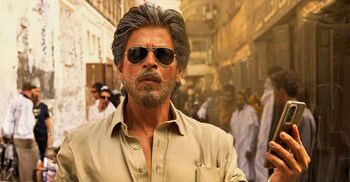Monkey Man review – Dev Patel directs and stars in a bloody revenge thriller

With his directorial debut Monkey Man, which he also co-wrote and stars in, Dev Patel (Slumdog Millionaire, Lion) cements himself both as an action star with A-list ambitions and a competent, resourceful B-movie director. This extravagantly violent and exuberantly messy revenge flick is set in a contemporary India (in a fictional city called Yatana) in which there seems to be a neon-drenched, sleaze-sodden brothel to suit every budget. It’s a place where power and money pollute, and where the poor are not just invisible, they are regarded as being less than human and little more than animals.
Patel takes this idea and runs with it, by incorporating the Indian caste system and class divisions into the story and drawing from the Hindu legend of the monkey-faced demigod Hanuman. When we meet Patel’s unnamed character – he calls himself Bobby, a name plucked at random from a carton of toilet bleach, but is referred to throughout as Kid – he is a scrappy slum-dweller carving out a living, one brutal beating at a time, as an underground bare fist fighter wearing a crude monkey mask. Patel litters the picture with further bestial imagery: the owner of the fight club is named Tiger (Sharlto Copley); Kid’s opponent in the ring takes his fight persona from a snake. And once Kid has embarked upon his campaign of retribution, he will eventually face up to a man who styles himself “the Lion of India”. This is a revenge movie with a beast in its heart and plenty of bite (literally, on multiple occasions).
It’s not a wholly original concept: with themes of underdogs, tooth for a tooth and hunter versus hunted, animalistic language has always been woven into the blood-soaked fabric of the revenge movie. Patel brings a fan’s appreciation of the genre to his film-making and does not attempt to hide his references. John Wick is mentioned by name in an early scene, and there’s a Wick-alike influence in the wardrobe department, with sleek, slim-fitted black suits adding a businesslike efficiency to key action set pieces. With his lithe, snake-hipped grace, it’s a look that Patel wears exceptionally well, so you can understand the temptation to borrow it wholesale from Keanu Reeves.
In the fight sequences, Patel looks to Indonesia for inspiration. His Kid attempts to match both the sympathetic everyman quality and the bloodbath intensity of action phenomenon Iko Uwais, star of The Raid. But in the kinetic, camera-as-combatant shooting style, it’s another Uwais movie, Headshot, directed by Indonesian carnage specialists The Mo Brothers, that feels like the closest reference point. We are hurled across kitchens, bathrooms, parking lots and alleyways; the camera somersaults, taking the flinching audience with it on an extended murder frenzy. It’s a visceral, breathless rampage, and while it’s a little rough around the edges at times, the picture’s brawling energy makes it an exhilarating ride.
Not everything works. There are a couple of thuddingly off-key music choices that jolt us out of the story. Kid, scarred by a horrifying childhood trauma that is gradually revealed in fragmented flashbacks, seeks to punish the guilty in the way he knows best. But since the guilty are the unreachable wealthy elite, he must first gain access to a luxury bordello presided over by a formidable, foul-mouthed madam named Queenie Kapoor (Ashwini Kalsekar). Once he has infiltrated the organisation (with the help of wisecracking drug dealer Alphonso, played by Pitobash), he has to work his way up to get to the big shots, including the corrupt and sadistic chief of police (Sikandar Kher). And there, among the VIPs and underworld power brokers, he encounters Sita (Sobhita Dhulipala), a sex worker who not only sees him, but recognises his pain and anger. The poignancy of the moment is rather undermined, however, by the use of a dire remix of Roxanne by the Police on the soundtrack.
Also slightly clunky is Patel’s attempt to counter the more bellicose tendencies of the genre by positioning Kid as a one-size-fits-all champion of disenfranchised outsiders. Our hero may slice off someone’s fingers with a canapé tray, but he’s also an ally to the transgender Hijra community after he is taken in and nursed back to health by the women. The film also refers tangentially to tribal land grabs and slum clearances, and to a simmering Modi-esque culture of division and hostility, but it is all a little too vague to coalesce into actual political commentary. Ultimately, Patel is clearly more at ease with the action aspect of his directorial debut. And it’s on this level, with its extended periods of axe-based mayhem and some creatively grisly facial injuries, that the film really delivers. Monkey Man doesn’t reinvent the revenge movie wheel exactly, but it does cover it with so much blood that you can barely see where the wheel ends and the pile of knife-perforated henchmen begins.
Source: The Guardian





